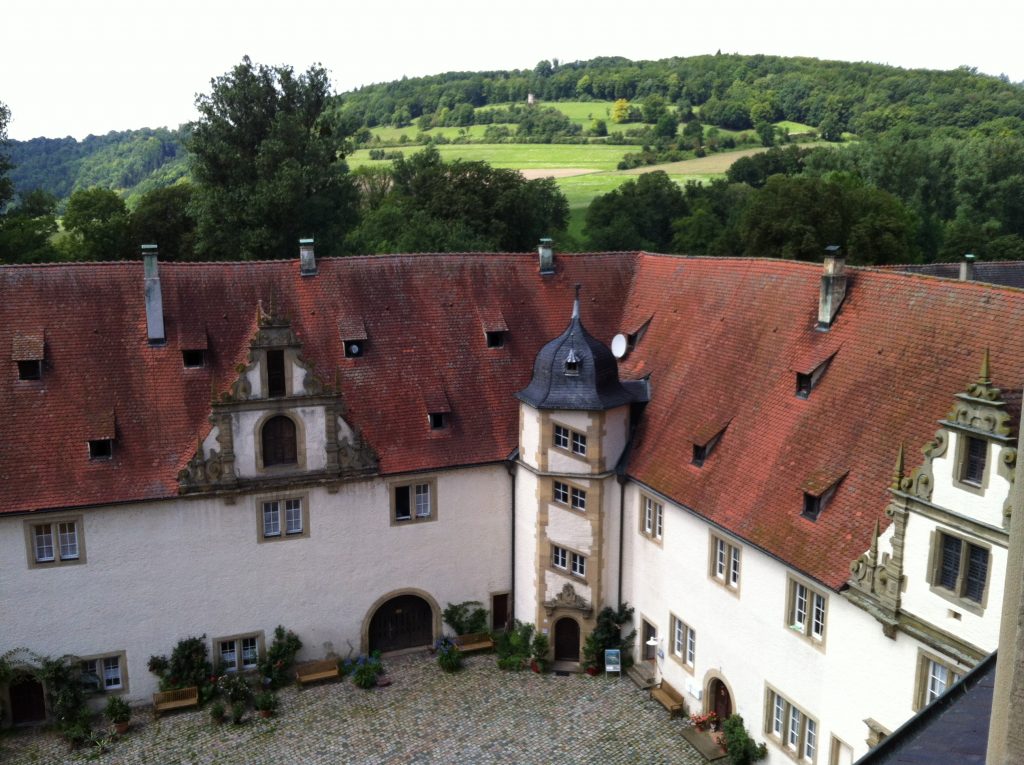
… but the fruit of inner attitudes.1
I have been working as a leadership coach for many years. Every few weeks, I go in this role to a monastery with managers who have lost their jobs. In the workshop we work on the themes of inner images, the future, failure, fear, hope and so forth.
They have been dismissed because of a personal conflict, have fallen victim to restructuring or have themselves decided to leave the company. What the participants have in common is that they previously had power over others and now have lost it. Until now, they had been used to developing visions, strategies and concepts and making decisions for others. Now, others have often decided over them.
As a consequence, some participants cannot imagine how to deal with their current situation in a goal-oriented way. Many of them are confronted with existential fears for the first time. Some feel impotent. Many lack the tools, such as how to write a “proper” job application. Others do not know how long the money will last to maintain the standard of living they and their family have hitherto enjoyed. And then there is also the group that still carries so much fury about what they have experienced that they cannot look into the future at all.
Intellect and previous experience are not enough to successfully deal with this complex situation. “As long as we merely download old thinking habits, we are trapped in our old mental world. We only see the shadows on the wall, shadows formed by passing figures in our own imagination.” 2
In the seminar I see a lot of shadows that the participants look at. Their fear is palpable, especially at the beginning of the workshop. But in the course of the 3 days the participants have the opportunity to incorporate their whole potential, i.e. also feelings, emotions, skills from other contexts and so on into their solution finding. “The only way out (out of our habits – the author) is to activate our senses.” 3

For some, entering the monastery grounds for the first time is already entering an unknown world. Baroque monasteries are often daunting. But the rooms are small, modern and functionally furnished, there is no TV, WiFi reception is poor (as is often the case in Germany), you can search for a telephone signal in the grounds and the walking distances are long. There is not a trace of comfort at first. That’s why many people wonder at the beginning of the workshop: “Do I want to be here? What am I supposed to do here? And hopefully it won’t be too psychological.” (whatever is meant by that…) The participants are forced to leave their comfort zone.
In the course of the workshop, usually on the first day already, there is a desire to open up and exchange experiences with people in the same situation. First there are regrets and expressions of anger at others (bosses, colleagues, advisory board, etc.). Then, after the first “me me me” warm-ups, the question often arises:” What will help me progress? What is the next step for me? Where do I actually want to go?” Most participants do not know where they want to go at the beginning but can first formulate what they do not want in the future. These are so-called avoidance motivations. But, as we all know, an away-from strategy – in NLP terms – is not a successful basis to shape a successfully and happy future. If the participants don’t also develop a positive motivation direction4, it won’t work. So how do you get from an “away from” strategy to a “towards” strategy?
To do this, the participants first work out what has made them really successful and happy in their lives. In the first phase of the exercise, each person draws their own success and happiness curve in two different colours on a large flipchart, preferably one above the other. In the next phase, they think about which events they want to highlight in both life curves, both peaks and troughs. In the third phase, they present the curves to the other participants and get feedback from them on their impact (what they say, what they don’t say, what they emphasise, how they express themselves, what body language they speak, what thoughts go through the others’ minds while listening, etc.).
In many cases, the participants distinguish between professional successes and private moments of happiness. Only in very few cases do professional success and personal happiness correspond. So far, and I have been conducting the workshops for almost 9 years, they are the exception. For many people, personal happiness has little to do with professional success.
Isn’t that incredible? The field in which we move most intensively in terms of time and emotion makes many of us less happy.

Back to the workshop: In the above exercise, the participants talk about their goals in life, their motives for achieving them and the skills they have more or less acquired to master certain situations. Through the feedback of the others, they learn more about the backgrounds to their actions. Without clarity about what was really important to me in the past, what I succeeded in doing and what I did not, what really made me happy, what I really understand by success and so on, I cannot shape my own future. Motivation to want to achieve something arises from the images we carry within us, the meaning we give to these images and our confidence that we have the necessary skills or can acquire them to make these images reality. When I know where I want to go and why I want to go there and what I need to get there, I just have to go.
As the workshop progresses, the individual participants then develop goal images, clarify their motives for wanting to achieve the goals and describe their idea of how they will get there. At the end of the workshop, I look at faces that radiate relaxed confidence. Of course, the participants still have fears about the future, but they know which path they want to take. And they are prepared for the highwaymen who are sure to ambush them on their way. They have begun to plan and believe in their own happiness and success again, despite the difficult situation.
That is why I have been conducting this workshop for so long. Because it makes me happy too.
And if you want to learn more about happiness, I recommend the TED Talk by Robert Waldinger5 about the longest happiness study in the world.
I now invite you to a silent introspection, if you like while jogging or doing any other exercise, you don’t have to sit still for it. Take 10 minutes (or more) and allow yourself to find answers to the following questions:
What motives guide your life?
What goals are you pursuing, for example in the coming year?
What makes you really happy in your professional and private life? What does this mean to you?
How would you describe your life so far?
And now the most important question: Are you happy, right now? Why?
Why not, actually?
Happiness does not depend on external circumstances, happiness is the decision to perceive the good and to allow a good feeling, no matter what the circumstances are at the moment.
Original text: HFI
English translation: BCO
1 Erich Fromm
2 Scharmer, Theorie U, p. 170
3 Scharmer, p.171
4 Zeitschrift OrganisationsEntwicklung Nr. 3, 2008
5https://www.ted.com/talks/robert_waldinger_what_makes_a_good_life_lessons_from_the_longest_study_on_happiness/transcript
Bildquellen
- bell-1176838_1920: val50 / Pixabay
- Mont St. Michel: HFI
- Kloster Schöntal 2: HFI

